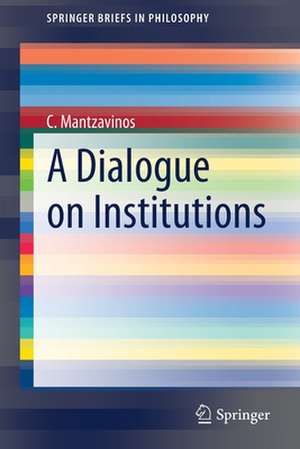A Dialogue on Institutions: SpringerBriefs in Philosophy
Autor C. Mantzavinosen Limba Engleză Paperback – 19 mar 2021
Din seria SpringerBriefs in Philosophy
-
 Preț: 345.63 lei
Preț: 345.63 lei - 17%
 Preț: 359.60 lei
Preț: 359.60 lei -
 Preț: 345.90 lei
Preț: 345.90 lei -
 Preț: 378.54 lei
Preț: 378.54 lei -
 Preț: 348.79 lei
Preț: 348.79 lei -
 Preț: 376.59 lei
Preț: 376.59 lei -
 Preț: 377.73 lei
Preț: 377.73 lei -
 Preț: 411.54 lei
Preț: 411.54 lei - 15%
 Preț: 463.68 lei
Preț: 463.68 lei -
 Preț: 378.12 lei
Preț: 378.12 lei -
 Preț: 376.80 lei
Preț: 376.80 lei -
 Preț: 440.86 lei
Preț: 440.86 lei -
 Preț: 375.45 lei
Preț: 375.45 lei -
 Preț: 341.86 lei
Preț: 341.86 lei -
 Preț: 444.13 lei
Preț: 444.13 lei -
 Preț: 376.80 lei
Preț: 376.80 lei -
 Preț: 377.73 lei
Preț: 377.73 lei -
 Preț: 408.05 lei
Preț: 408.05 lei -
 Preț: 375.07 lei
Preț: 375.07 lei -
 Preț: 377.35 lei
Preț: 377.35 lei -
 Preț: 481.79 lei
Preț: 481.79 lei -
 Preț: 413.66 lei
Preț: 413.66 lei - 15%
 Preț: 463.85 lei
Preț: 463.85 lei -
 Preț: 380.84 lei
Preț: 380.84 lei -
 Preț: 376.59 lei
Preț: 376.59 lei -
 Preț: 376.22 lei
Preț: 376.22 lei -
 Preț: 376.80 lei
Preț: 376.80 lei -
 Preț: 349.10 lei
Preț: 349.10 lei -
 Preț: 348.79 lei
Preț: 348.79 lei -
 Preț: 377.18 lei
Preț: 377.18 lei -
 Preț: 132.39 lei
Preț: 132.39 lei -
 Preț: 380.25 lei
Preț: 380.25 lei -
 Preț: 380.25 lei
Preț: 380.25 lei -
 Preț: 475.83 lei
Preț: 475.83 lei -
 Preț: 378.12 lei
Preț: 378.12 lei -
 Preț: 378.34 lei
Preț: 378.34 lei -
 Preț: 379.68 lei
Preț: 379.68 lei -
 Preț: 343.00 lei
Preț: 343.00 lei -
 Preț: 377.73 lei
Preț: 377.73 lei - 20%
 Preț: 321.52 lei
Preț: 321.52 lei -
 Preț: 343.33 lei
Preț: 343.33 lei -
 Preț: 481.05 lei
Preț: 481.05 lei -
 Preț: 379.68 lei
Preț: 379.68 lei -
 Preț: 377.57 lei
Preț: 377.57 lei -
 Preț: 376.80 lei
Preț: 376.80 lei -
 Preț: 475.83 lei
Preț: 475.83 lei -
 Preț: 407.52 lei
Preț: 407.52 lei - 15%
 Preț: 461.73 lei
Preț: 461.73 lei -
 Preț: 345.63 lei
Preț: 345.63 lei -
 Preț: 379.86 lei
Preț: 379.86 lei
Preț: 375.45 lei
Nou
Puncte Express: 563
Preț estimativ în valută:
71.84€ • 75.20$ • 59.80£
71.84€ • 75.20$ • 59.80£
Carte tipărită la comandă
Livrare economică 31 martie-14 aprilie
Preluare comenzi: 021 569.72.76
Specificații
ISBN-13: 9783030630157
ISBN-10: 3030630153
Pagini: 65
Ilustrații: IX, 65 p. 3 illus., 1 illus. in color.
Dimensiuni: 155 x 235 mm
Greutate: 0.12 kg
Ediția:1st ed. 2021
Editura: Springer International Publishing
Colecția Springer
Seria SpringerBriefs in Philosophy
Locul publicării:Cham, Switzerland
ISBN-10: 3030630153
Pagini: 65
Ilustrații: IX, 65 p. 3 illus., 1 illus. in color.
Dimensiuni: 155 x 235 mm
Greutate: 0.12 kg
Ediția:1st ed. 2021
Editura: Springer International Publishing
Colecția Springer
Seria SpringerBriefs in Philosophy
Locul publicării:Cham, Switzerland
Cuprins
The Dialogue.- Notes.- Bibliography.
Notă biografică
C. Mantzavinos is Professor of Philosophy of the Social Sciences in the University of Athens. He is the author of Wettbewerbstheorie (Berlin: Duncker & Humblot, 1994), Individuals, Institutions, and Markets (Cambridge: Cambridge University Press, 2001), Naturalistic Hermeneutics (Cambridge: Cambridge University Press, 2005) Explanatory Pluralism (Cambridge: Cambridge University Press, 2016), A Dialogue on Explanation (Heidelberg and New York: Springer, 2018) and the editor of Philosophy of the Social Sciences (Cambridge: Cambridge University Press, 2009). He has published numerous articles in scholarly journals in four languages, notably “Learning, Institutions, and Economic Performance” in Perspectives on Politics, 2004 (with Douglass North and Syed Shariq) and “Explanatory Games”, in: The Journal of Philosophy, 2013. He is the Philosophy Section Editor of the 2nd edition of the International Encyclopediaof the Social and Behavioral Sciences (succeeding Philip Pettit and Axel Hoenneth) that appeared in 2015.
Before his current appointment in Athens, he held the Chair of Economics and Philosophy at Witten/Herdecke University, Germany (2004-2011). He has also taught at Freiburg, Bayreuth, and was a Visiting Assistant Professor at Stanford (2000-2001). He was a Senior Research Fellow at the Max Planck Institute for Research on Collective Goods, Bonn (2001-2004) and served as a Visiting Scholar at Harvard (twice), at Maison des Sciences de l’Homme, Paris (twice) and at the University Center for Human Values at Princeton. He holds two PhD’s, in Economics and in Philosophy, both from the University of Tübingen.
Textul de pe ultima copertă
This book consists of a dialogue between two interlocutors, Pablo and a student, who discuss a great range of issues in social philosophy and political theory, and in particular, the emergence, working properties and economic effects of institutions. It uses the dialogical form to make philosophy more accessible, but also to show how ideas develop through intellectual interaction. The fact that one of the interlocutors is the "student" in a place in the real world makes the dialogue quasi-fictive in character and enables the active engagement of the reader. After all, we are all philosophers and we develop our own philosophy by exchanging views and arguments. The dialogue form is and should remain the principal form of philosophizing, since ideas, like butterflies, do not merely exist – they develop. This is certainly the case in actual philosophical interaction, and it can be the case in written philosophical exposition. Although the dialogue does not presuppose prior acquaintance with the respective philosophical and social scientific literature under discussion in this book, it makes arguments more accessible, and conveys the feeling that there are no definite solutions to philosophical problems.
Caracteristici
Introduces a novel theory of institutions Defends the position of cognitive institutionalism Takes the form of a philosophical dialogue
